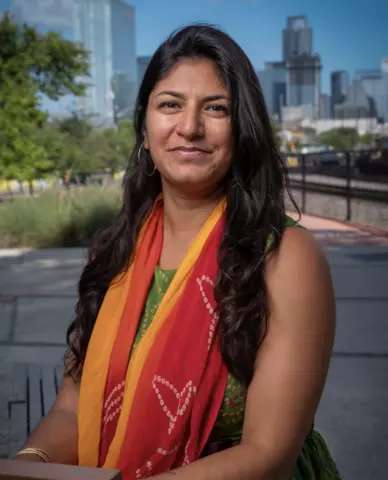Anika Fassia

Anika is the co-founding Co-Executive Director of We Make the Future (WMTF) and We Make the Future Action (WMTFA). WMTF/A launched in early 2021 to combine strategic communications and coalition building to implement race forward narratives that motivate our base and persuade the middle for wins that allow all our communities to thrive. Anika leads WMTF/A’s strategic direction and engagements in partnership with researchers, content creators, labor and community based organizations to bridge narrative and practice through creative implementation. Anika was the former Director of Race Class Narrative Action where she led the outreach and partnerships of organizations spanning seven Midwestern states. Prior to Race Class Narrative Action, she managed the inception of the Race Class Narrative which originated through a collaboration between ASO Communications, Heather McGhee and Ian Haney López in 2017. In 2016, Anika also became a Registered Nurse and continues to practice pediatric and community health nursing to stay grounded in the impact of our policies on the lives of families.
Presentations from Facing Race 2022
The ability to defeat racist policies and candidates at the ballot box in most states requires building broad multiracial electoral coalitions. This is no easy task. What does it take to build a “Bigger We” than we currently have in our organizations and movements? What kind of demands are required? How do we change the way we work to build lasting alliances to build power and challenge the racist threat and challenges to democracy? What can be learned from the Race-Class Narrative (RCN) and other approaches to speaking beyond the choir? Join us for a panel discussion of grassroots organizers doing the hard work on the ground and national leaders reflecting on the challenge we face.
Presentations from Facing Race 2018
The progressive movement stands divided. Some insist we mobilize the white working class, others the new American electorate—and both camps seem to regard these choices as mutually exclusive. This division is unnecessary and debilitating. The right builds popular support for politicians beholden to billionaires by using dog whistles to stoke anxiety around race—demonizing black lives, undocumented immigrants and Muslims. To counter this, progressives can and must speak simultaneously and forcefully to the connections between class and race. A robust conversation about race is critical to converting the aspiration of a “New American Majority” into an energized and cohesive force. The question is how to engage around race and class in ways that build solidarity, reduce division and scapegoating, and create a viable foundation for both electoral and policy victories. Therefore, Demos embarked on a narrative project In order to shift the tide of racially and economically divisive politics that strategically uses racism to divide the working class and poor so that a few can gain. We wanted to uncover a narrative that would help people envision a multiracial country in which everyone has economic opportunity. Our Integrated Race & Class Narrative Project started with the premise that we can rebut the right’s faux populism and white nationalism with a potent new story. Join us to learn, discuss and practice strategies on how to unify constituencies across race and class in your electoral campaigns, grassroots organizing, media outreach, and legislative advocacy to mobilize a multiracial coalition and increase progressive governing power.
Presentations from Facing Race 2014
The challenges and opportunities of an increasingly diverse America demand that we rebuild broad public support for an active governmental role in creating opportunities and reducing inequities. Our shared prosperity as a society depends on the advancement of all our people, regardless of their race, ethnicity or country of origin. The implicit and explicit racialization of policies, programs and public systems can not only exacerbate inequities but also influence the public’s perception of and relationship to government. Join us to learn about recommendations for advancing a constructive dialogue about race and government in your policy analysis, media outreach, organizing and legislative advocacy.